Topics
- active learning (18)
- research assignments (6)
- libraries (1)
- literature-based learning (2)
- multimedia (5)
- museums (6)
- object learning (7)
- online learning (5)
- peer instruction (10)
- storytelling (2)
- learning management system (2)
- syllabus design (3)
- teaching empathy (3)
- teaching fellows (1)
- lecture (3)
- learning goals (8)
- assessment (6)
- data (3)
- backward design (3)
- blended approaches (12)
- case-based learning (8)
- classroom contracts (7)
- classrooms and space (3)
- collaborative learning (27)
- community events (1)
- course transformation (7)
- devices (3)
- learning by making (5)
- discussion (24)
- engaged scholarship (4)
- experiential learning (16)
- feedback (18)
- group work (8)
- guest speakers (7)
- interdisciplinary (6)
- leadership (3)
Send feedback
Subscribe
Copyright © 2024 The President and Fellows of Harvard College | Privacy | Accessibility | Digital Accessibility | Report Copyright Infringement

 Sharad Goel, Professor of Public Policy (HKS), teaches statistical methods in his application-oriented course,
Sharad Goel, Professor of Public Policy (HKS), teaches statistical methods in his application-oriented course, 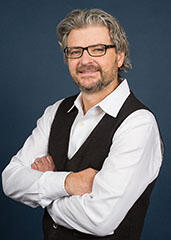 Matt Andrews, Edward S. Mason Senior Lecturer in International Development at Harvard Kennedy School, is the faculty director of the
Matt Andrews, Edward S. Mason Senior Lecturer in International Development at Harvard Kennedy School, is the faculty director of the  Candace Bertotti,
Candace Bertotti, 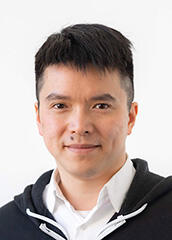 Hong Qu, Adjunct Lecturer in Public Policy, taught
Hong Qu, Adjunct Lecturer in Public Policy, taught 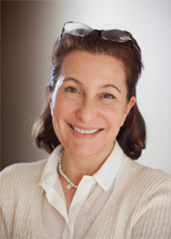 Linda Bilmes, Daniel Patrick Moynihan Senior Lecturer in Public Policy, created the Harvard Kennedy School’s
Linda Bilmes, Daniel Patrick Moynihan Senior Lecturer in Public Policy, created the Harvard Kennedy School’s 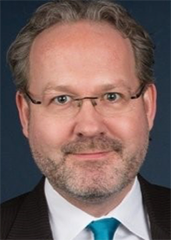 Jorrit de Jong, Lecturer in Public Policy, combines practice, research, and engagement with learning and teaching in his course
Jorrit de Jong, Lecturer in Public Policy, combines practice, research, and engagement with learning and teaching in his course 
 Like many instructors of required courses, Pinar Dogan, Lecturer in Public Policy and SLATE Faculty Liaison for Pedagogy, teaches her section of
Like many instructors of required courses, Pinar Dogan, Lecturer in Public Policy and SLATE Faculty Liaison for Pedagogy, teaches her section of 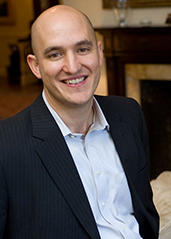 Todd Rogers, Professor of Public Policy, teaches students in
Todd Rogers, Professor of Public Policy, teaches students in 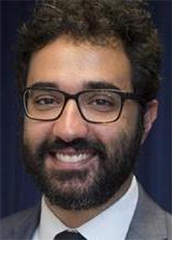
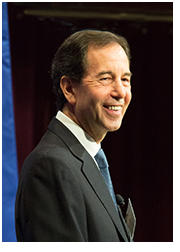 Ronald Heifetz, Co-Founder of the Center for Public Leadership and King Hussein bin Talal Senior Lecturer of Public Leadership, uses experiential teaching methods like student case analysis—where students collaboratively develop and analyze cases drawn from their own work experiences—to promote deeper engagement and stronger retention of leadership concepts.
Ronald Heifetz, Co-Founder of the Center for Public Leadership and King Hussein bin Talal Senior Lecturer of Public Leadership, uses experiential teaching methods like student case analysis—where students collaboratively develop and analyze cases drawn from their own work experiences—to promote deeper engagement and stronger retention of leadership concepts.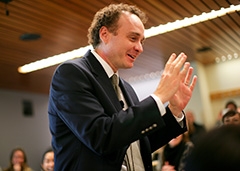 Dan Levy, Senior Lecturer in Public Policy and Faculty Chair of the
Dan Levy, Senior Lecturer in Public Policy and Faculty Chair of the  José A. (Tony) Gómez-Ibáñez, Derek C. Bok Professor of Urban Planning and Public Policy, who holds appointments at the GSD and HKS, defines the learning objectives of his course prior to the start of the semester and references them to frame each individual class session: “I use the first five minutes to place each class in the course – ‘The last class we talked about X and today we want to see how those ideas might apply to Y.’”
José A. (Tony) Gómez-Ibáñez, Derek C. Bok Professor of Urban Planning and Public Policy, who holds appointments at the GSD and HKS, defines the learning objectives of his course prior to the start of the semester and references them to frame each individual class session: “I use the first five minutes to place each class in the course – ‘The last class we talked about X and today we want to see how those ideas might apply to Y.’” ...
...